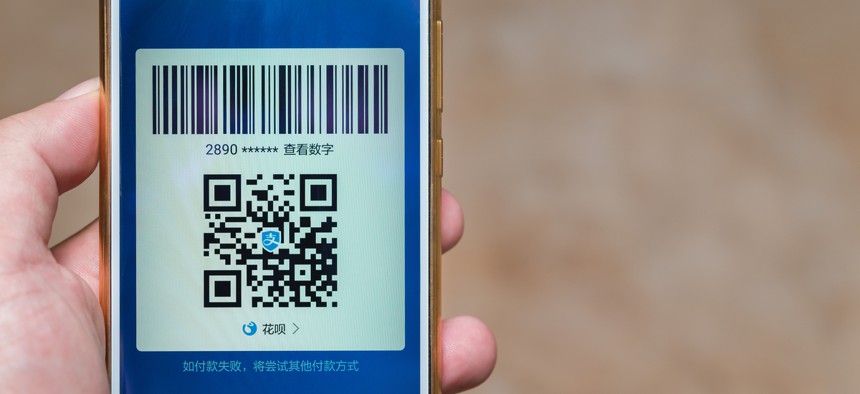Trump Executive Order Attempts to Ban 8 More Chinese Apps

Freer/Shutterstock.com
The move adds more Chinese companies—including three payment apps—to a list that already included TikTok and WeChat.
An executive order issued late Tuesday looks to expand earlier attempts by the Trump administration to block U.S. citizens from using certain Chinese apps, including some that process financial transactions.
The “Executive Order Addressing the Threat Posed By Applications and Other Software Developed or Controlled By Chinese Companies” issued Tuesday would prohibit the use of eight apps built and operated by Chinese businesses in an attempt to limit the amount of U.S. data going to the Chinese government.
“The pace and pervasiveness of the spread in the United States of certain connected mobile and desktop applications and other software developed or controlled by persons in the People's Republic of China, to include Hong Kong and Macau, continue to threaten the national security, foreign policy, and economy of the United States,” the order states. “By accessing personal electronic devices such as smartphones, tablets, and computers, Chinese connected software applications can access and capture vast swaths of information from users, including sensitive personally identifiable information and private information.”
The new order extends previous pronouncements to include eight more China-based apps, three of which handle financial transactions: Alipay, CamScanner, QQ Wallet, SHAREit, Tencent QQ, VMate, WeChat Pay and WPS Office.
Under the order, “certain future transactions” would be prohibited, as determined by the commerce secretary.
On a call with reporters Tuesday evening, a senior administration official with the National Security Council noted apps, especially those on smartphones, collect a wealth of data on the user. In the case of Chinese-owned and -operated apps, that data is going to Chinese businesses, which are obliged to share that data with the Chinese government, the official said.
“I think we’re all aware that Beijing requires, really, all commercial companies, no matter how large or small, to support the Chinese Communist Party’s political objectives,” they said.
During the call, reporters noted executive orders in August attempting to ban TikTok and the messaging side of WeChat have been tied up in the courts and not implemented. The administration official suggested those bans were being held up on First Amendment grounds, as they are social media platforms.
“That particular case would probably not be easily brought against some of these other applications that we’ve named today,” they said.
While the executive order cites previous hacking campaigns attributed to the Chinese government—including the 2015 hack of the Office of Personnel Management— and “the continuing activity of the PRC and the Chinese Communist Party to steal or otherwise obtain United States persons' data,” the companies cited have not been accused of hacking user devices or any other unlawful activity.
“The software applications that were chosen were largely chosen based on risk,” the administration official said. “We cannot get into whether and what type of information we may or may not have regarding specific applications … and what other nefarious or otherwise activity is being done by some of these companies.”
But the biggest issue, according to the official, is scale.
“If you look up some of these apps, they all have extremely high numbers of users and downloads,” they said. “We’re talking tens of millions of devices. And the mass collection of information and data going into PRC—whatever government department, AI algorithms, or what have you—the potential for that is what we’re talking about: the risk.”
Per the order, the commerce secretary is also charged with identifying any additional Chinese apps to add to the list and develop a report “with recommendations to prevent the sale or transfer of United States user data to, or access of such data by, foreign adversaries.” Those recommendations should include “regulations and policies to identify, control and license the export of such data.”
“I think every American ought to look at what these apps seek to do … in terms of what happens when you allow these applications to gain access to your phone, what information they pass back, essentially to the Chinese Communist Party, to people that are by law—by Chinese law—required to comply with the secret directives of the Chinese Communist Party,” the official said. “It essentially feeds them tools of mass oppression for billions of people worldwide. And we’re just not interested in facilitating that.”
But as with the TikTok and WeChat bans, federal watchers say this order is unlikely to have much effect.
“On its face, I don't think this is hugely impactful,” Stan Soloway, president and CEO of Celero Strategies and a former Defense Department acquisition official, told Nextgov. “After all, all it does is tell [the commerce secretary] to study the issue and to work with the broader [intelligence community] to assess risk.”
Soloway cited other moves directed at Chinese companies as having a much bigger impact here at home, including executive orders and legislation banning the use of telecommunications equipment from vendors like Huawei and ZTE and prohibiting selling certain U.S.-based technologies to Chinese companies.
That said, he was in favor of having the Commerce Department look deeper into these companies and the data being collected.
“I suspect most people would consider those kinds of analyses to be prudent given what we know,” he said. “But this new EO is just a first step. It raises an issue worth looking at. And reinforces the fact that we have a number of such issues to come to grips with.”






